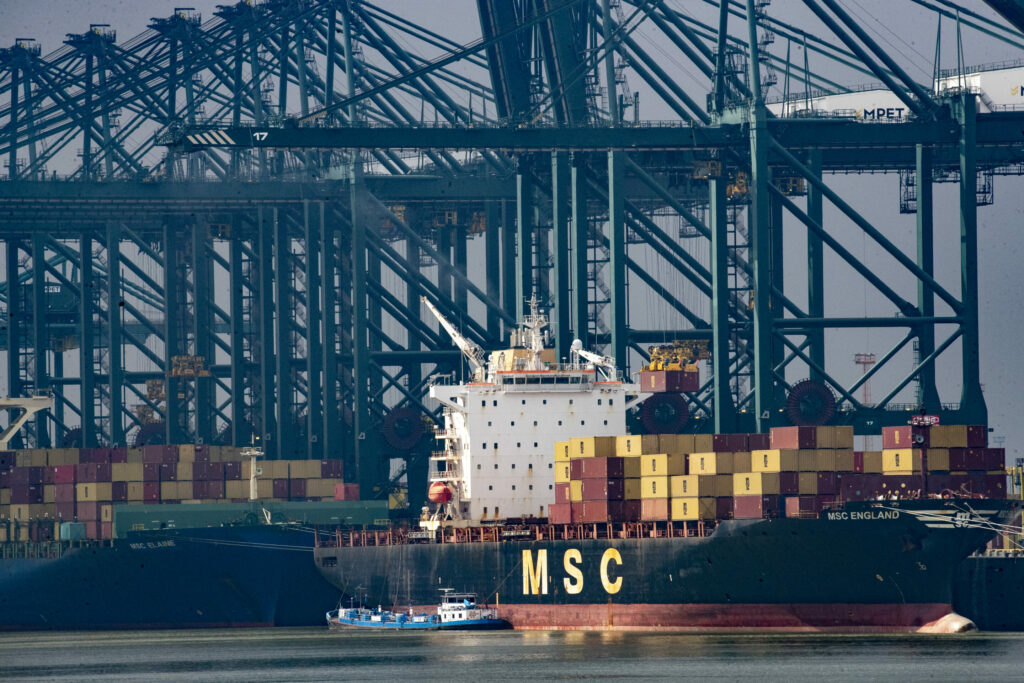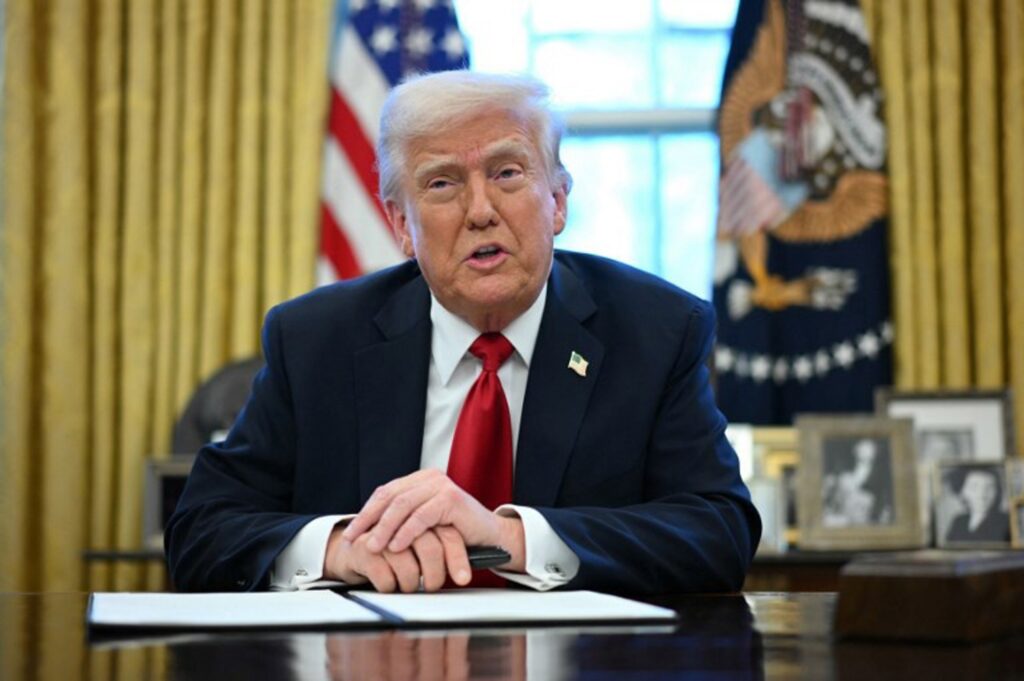Belgium and other EU Member States are bracing themselves for the impact of the 20% trade tariffs announced by United States President Donald Trump on Wednesday. Referring to the day as "Liberation Day," Trump says he wants to free the US from "unfair trade practices."
European Commission President Ursula von der Leyen said on Thursday morning that Trump's decision was "a major blow" to the global economy and that the EU is already working on "a new package of countermeasures" in case the negotiations with the American administration should fail.
The new "Liberation Day" tariffs will come on top of the 25% already applied to steel, aluminium and cars.
The move has been significantly criticised by Belgium's Foreign Minister Maxime Prévot (Les Engagés). While he believes "no one wins in a trade war," he underlined that Belgium backs the European Commission's plans for a "strong and proportional response."
Prévot condemned the US' decision to "unilaterally attack the global trade order by imposing tariffs on everyone," labelling it as "regrettable." He added that the US is "playing with fire" and may "ultimately burn itself."
Building bridges, not barriers
The Foreign Minister stressed that these tariffs will impact Belgian businesses and citizens, particularly by reducing economic growth. "At a time when the United States is asking us to increase our defence spending, these tariffs could negatively impact Belgium's economic growth," he noted.
According to Prévot, the US' decision is especially damaging as it undermines multilateralism and targets its partners by imposing tariffs. However, he emphasised the need to "build bridges instead of erecting new barriers."
Belgium will analyse the impact of the tariffs and support the European Commission's planned "strong and proportional response." He noted that any action taken should not harm Belgium more than it affects the US. "We will respond swiftly, assertively, proportionately, and in unity with a strategy that protects our economy," Prévot stated.
The introduction of the new US import tariffs would mean that US consumers and companies would have to cough up about €2.9 billion in import duties on Flemish products – an eightfold increase compared to the €376 million in duties on an annual basis now, a according to a first preliminary calculation by Flemish Minister-President Matthias Diependaele (N-VA).
Meanwhile, Belgium's technology sector faces more than €1 billion in new duties on exports: for the sector, the US is the most important trading partner after the EU and the UK, according to technology federation Agoria. "Last year, Belgian technology companies exported €5.5 billion worth of goods to the US. Over €1 billion in duties will now be added to that, which will undoubtedly put a strong brake on exports."

Credit: Belga/David Stockman
On Thursday, Director of Europe and International Affairs at the Federation of Enterprises in Belgium (FEB) Olivier Joris said the tariffs could impact Belgium both directly and indirectly. "We fear this could be very damaging for Belgium, Europe, and the global economy."
Belgian companies would be affected in two ways, he said. "Firstly, there is the impact on our bilateral trade relations with the United States. The Americans are our fourth-largest trading partner after Germany, France, and the Netherlands. The announcement of an additional 20% tariff is obviously very bad news."
Secondly, Belgium exports many semi-finished components to countries like France, Germany, and the Netherlands, which then export finished products to the United States. "We could therefore be doubly affected."
While the FEB noted that it is too early to quantify the impact, but warned that the negative effect is "inevitable." They added that this "is a lose-lose scenario" as "European and Belgian products will become less competitive, but this could also lead to inflation in the United States."
'Crucial export country'
In the run-up to Trump's announcement on Wednesday evening, the EU was preparing for the impending economic shocks to international free trade. Particularly Member States with an export economy are at risk of feeling a trade war with the US.
In Belgium, Prime Minister Bart De Wever (N-VA) said in Parliament last week that he is on guard. "This debate goes straight to our hearts. After neighbouring countries Germany, the Netherlands and France, the United States is our most important sales market: 7.5% of total exports – good for a trade flow of €33 billion."
He stressed that the US is "certainly a crucial export country" for Belgium's pharmaceutical and chemical sectors.
While Belgium is in desperate need of economically healthy years to help reduce the budget deficit, recent calculations by ING bank indicate that a trade war with the US could reduce economic growth by 0.11% in the first year, and by 0.69% in the long term – "impressive figures," according to De Wever.

Prime Minister Bart De Wever (N-VA), Wednesday 19 March 2025. Credit: Belga / Hatim Kaghat
The US is Belgium’s fourth-largest export market, with an export value of €28.03 billion in 2023 – representing 7.6% of total exports, according to ING.
However, Belgium's strong integration into global value chains means that Belgian exports are not entirely produced domestically: the export of a Belgian product to the US typically consists of about 45% domestic added value and 55% value added from abroad.
"The chemical and pharmaceutical sectors, which are particularly exposed to the US market, and food and beverages generally have higher domestic added value than sectors that are highly dependent on foreign raw materials, such as base metals and petroleum products," said ING economist Ruben Dewitte. "The same goes for products that are part of value chains across several countries, such as the automotive sector."
Chain reactions
These global value chains also mean that Belgian exports are indirectly exposed to the United States via other countries. For example, think of a car part produced in Belgium that is installed in a car in Germany before it crosses the ocean; while Belgium's direct exposure to the US amounts to around 0.9% of GDP, it increases to 1.54% via EU exports to the US.
As Trump has now imposed tariffs on nearly the entire world, Belgium’s total exposure to the US amounts to around 2.1% of GDP.

Ship to shore cranes, docked ship and loaded with containers pictured at Antwerp harbour, Saturday 08 April 2023. Credit: Belga/Nicolas Maeterlinck
In Belgium, De Wever has repeatedly warned that the EU has nothing to gain from a trade war with the US, but he also stressed the importance of "sending the signal that we are not a doormat that Trump can walk on." At the same time, however, he warned against "wild anti-American statements."
In the meantime, the combination of expected import tariffs and great uncertainty is causing companies to postpone investments. In turn, this puts the Belgian economy under even more pressure as growth remains low.
'Disastrous consequences'
Von der Leyen deplored the decision on Thursday morning, stating that it would have "disastrous consequences for millions of people around the world," and more particularly "the most vulnerable countries." "There seems to be no order in the disorder," she worried, analysing Trump's choices.
"I agree with President Trump that others are taking unfair advantage of the current rules," the President of the European Commission declared. "But I also want to be clear that using tariffs as a first and final tool will not be a solution to the problem. That is why, from the outset, we have always been ready to negotiate with the United States in order to remove the remaining obstacles to transatlantic trade."
"Let us move from confrontation to negotiation," she called again in her speech from Samarkand, Uzbekistan, where she is attending the first EU-Central Asia summit until Friday.

